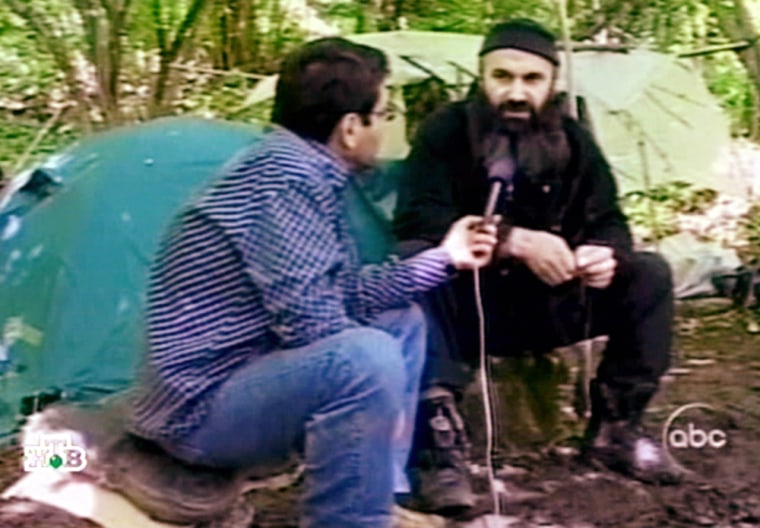Russian journalists were dismayed and worried by the announcement on Tuesday that the Russian government was barring ABC News from working here in retaliation for the television channel's broadcast of an interview with Shamil Basayev, the Chechen rebel leader and a self-proclaimed terrorist.
"This is some kind of paranoia," said Oleg Panfilov, Director of the Center for Journalists in Extreme Situations in a telephone interview.
"To punish a network for airing an interview with a person that the Russian authorities have not managed to capture is evidently a form of revenge for their own lack of success." Russian television companies have no qualms about showing al-Qaida leaders Osama bin Laden, Abu Masab al-Zarqawi or other terrorists, he pointed out.
"They had to react somehow, and better to condemn its broadcasters than to discuss its content," Russian investigative journalist Julia Latynina wrote in her weekly column in the Moscow Times.
Contact with ABC now ‘undesirable’
The Russian Ministry of Foreign Affairs issued a statement on its Web site, which was also read on state television by its deputy spokesman, Boris Malakhov, declaring Russia would not "renew accreditations of this televisions company's staff after they expire." Foreign journalists must have a Foreign Ministry accreditation to work legally in Russia.
The statement also said that in the interim all government agencies should view contact with ABC as "undesirable," accusing the network of "propagandizing terrorism."
The Ministry declined on Wednesday to add any further explanation or details to what amounts the first expulsion of a television channel in post-Soviet Russia.
Self-avowed terrorist
Basayev is considered an international terrorist by the United States, the United Nations, and has a $10 million bounty on his head.
In the interview, which aired on the ABC News program "Nightline" on July 28, Basayev attempted to justify his attacks. He said attacks such as the hostage taking at a school in Beslan last September that left more than 330 dead, including 186 children, was retribution for thousands of Chechen civilians killed at the hands of the Russian army. Chechnya began a war for independence from Russia over a decade ago.
ABC News President David Westin expressed sympathy for the suffering the Russians have experienced from Chechen terrorism, but defended the broadcast.
"No civilized people can condone the murder of innocent civilians. The mission of a free press is to cover news events, even those involving illegal acts, to help our audience better understand the important issues that confront us all," said Westin in a statement released by ABC.
Westin said ABC regretted the action taken by the Russian government, but said, "We cannot allow any government to deter us from reporting the news fully and accurately.”
Media clampdown
Russian President Vladimir Putin's Kremlin has slowly taken control over all the major networks in Russia. As a result, coverage of the war in Chechnya, as well as criticism of the government's policies, has all but disappeared.
Putin, who usually displays a cool, calm demeanor, has lost his temper several times at journalists over questions about Chechnya.
Foreign journalists whose coverage of the war has not been to the government's liking have often had their visas to Russia denied, with no explanation given.
Panfilov's center has collected a list of over 30 foreign journalists who have been banned from Russia, all of who criticized the government's policies in Chechnya.
"If the Russian government took this action with a foreign company, it means that other measures are being prepared for Russian journalists. They are already being implemented anyway," said Panfilov.
"Since 2000, journalists here [have been] informed that they simply must support the decisions of the president and government," Panfilov explained, referring to the start of Putin's first term. "Practically nothing is written about what is happening in Chechnya and it obviously angers the Kremlin when ABC or other foreign TV companies show what is happening there."
Russians don’t want to ‘look in the mirror’
"The Russian authorities don't want to look in the mirror," added Panfilov. "You can't even talk about freedom of the press anymore."
The interview was conducted by Russian journalist Andrei Babitsky, on leave from his job at Radio Free Europe/Radio Liberty. Babitsky is based in Prague, Czech Republic.
Both foreign and Russian journalists officially must have a government escort when working in Chechnya, though the government has not enforced this rule. The Foreign Ministry accused Babitsky of breaking the law, but it is unclear what charges he would face if he reenters the country.
"Of course the Russian authorities are angry that Babitsky filmed an interview with Shamil Basayev on the territory of Chechnya when at the same time the President and the army is saying that there is only order, peace and democracy there," said Panfilov. "Good thing Babitsky has a green card."
